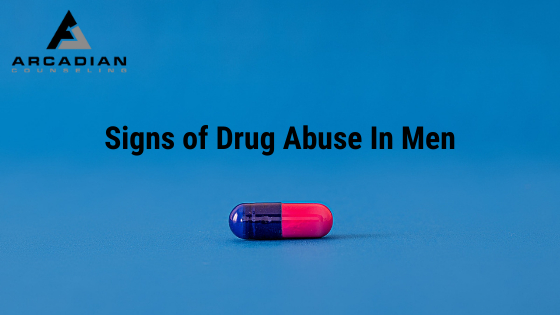While both men and women suffer from drug and alcohol addiction, the reality is that men tend to suffer at a much higher rate than women. The signs of drug abuse in men, however may differ somewhat than that of women. According to the National Institute on Drug Use, men are more likely than women to try illicit (marijuana, cocaine, opiates, etc.) drugs and have a higher rate of dependence on said drugs.
Why are the numbers so high?

The signs of drug abuse and addiction can look different in men.
To understand the impact of addiction in men, it’s helpful to look at the statistics. The Substance-Abuse and Mental Health Administration reports that roughly 67% of all substance-abuse admissions in the United States are male. These numbers hold up, regardless of age, sexual preference, or ethnic group.
why the disparity?
One explanation may be that men are simply more prone to risky behaviors. Men tend to be the ones that drive fast, scale buildings, and experiment with illicit drugs. Men also turn to drugs to self-medicate their depression and anxiety more often than women. While both men and women suffer from depression and anxiety, men don’t typically seek help from a therapist, counselor, or life coach.
Why?
Most men feel that to reach out for help is an act of weakness. And so they go it alone, using alcohol and other drugs to soothe their pain.
Signs of Drug Abuse & addiction:

One of the most alarming signs of drug abuse in men is repeated failed attempts to discontinue or moderate use.
- Drinking or using drugs on a daily basis.
- Drinking or using drugs alone.
- Hiding drug use.
- One or more DUI.
- Sudden problems at work or with friends/family relationships.
- Repeated failed attempts to stop or moderate use.
- Physical withdrawal symptoms such as anxiety, fatigue, sweating, vomiting, depression, seizures, and hallucinations.
- Sudden weight loss or gain.
- Loss of interest in hobbies and other activities.
common causes of drugs & alcohol abuse in men
Now that we’ve explored the signs of drug abuse in men, let’s explore some of the causes.
Grief & Loss
Men are taught to “be strong,” “man-up” and “keep it together.” Translation: it’s not ok to express your emotions. So men often turn to substances to manage the overwhelming emotions associated with grief & loss.
Childhood abuse
Sexual, physical, and emotional abuse and neglect in childhood can often lead to drug abuse and addiction later in life.
Trauma in adulthood
Men who undergo a traumatic experience in adulthood are often prone to using substance to self-medicate the symptoms of PTSD and anxiety.
Expectations of masculinity
Men are taught at an early age that men don’t show weakness and that “real men” aren’t afraid of taking risks. This type of expectation often leads to riskier and dangerous behaviors such as illicit drug use.
Genetic Predisposition
A family history of drug and alcohol abuse is often a big factor in substance use for men. Especially men whose fathers struggled with substance abuse.
Pressure to perform
Life stressors such as pressure to perform at work, provide financial stability for the their families, and show up for all the family events combined with lack of social supports contribute to substance abuse.
Treatment for drug Abuse & Addiction

While men are more likely to suffer from drug abuse, women are more likely to relapse during recovery.
Recovering from drug abuse and addiction is a complex thing. If physical addiction is present, men will have to go through an unpleasant detox period to remove the drug from their body. Then they will have to commit to some form of therapy or counseling to understand the psychological and behavioral reasons behind their abuse and addiction. This is a challenge for most men as they have a higher resistance to therapy than women do.
Counseling and therapy can be done in a one-on-one or in a group setting. Having a strong support network, who understand what the signs of drug abuse look like is critical when recovering from drug and alcohol abuse or addiction. This can be in the form of support groups like AA or Smart Recovery or it can be in the form or a strong social support network of family and friends.
Life is short. Addiction isn’t. If you’re struggling to manage the challenges and pressures of life and find yourself self-medicating or abusing drugs and alcohol, find an awesome therapist you like and trust to help you sort things out and get back on track.
James Killian, LPC is the Principal Therapist & Owner of Arcadian Counseling in New Haven, CT where they specialize in helping over-thinkers, high achievers, and perfectionists reduce stress, increase fulfillment and enhance performance so they can move From Surviving To Thriving.

